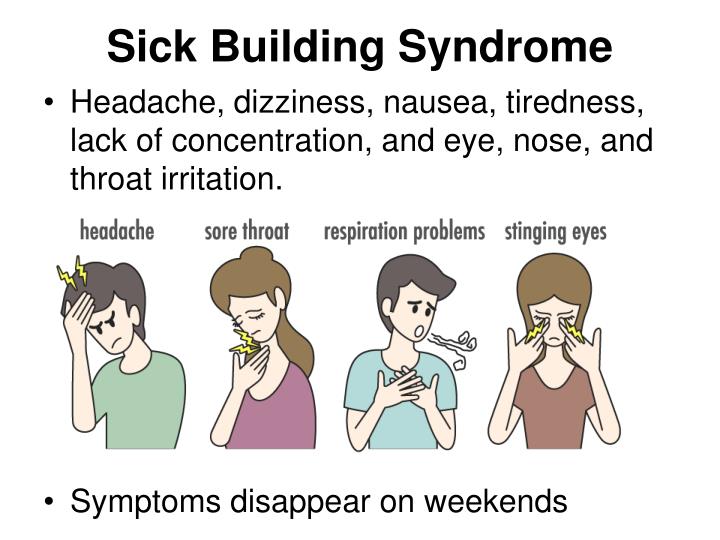


#Sick building syndrome update
Update computer monitors and other display systems.Get a test for possible indoor mold or fungus.Find the right humidity - NHS Choices recommends an optimal humidity level of 40 to 70 percent.Change out air filters every couple of months (or more, if necessary).Use cleaning products with low fumes and no fragrances.You or your boss may consider the following: Some steps to treat SBS can also be taken by employers. These may include long-term medications, such as leukotriene modifiers or an inhaler for acute symptoms. Asthma medications may be needed for wheezing and other breathing difficulties. Over-the-counter options, such as Benadryl and Zyrtec, are widely available. SBS is primarily treated by alleviating symptoms while reducing your exposure to the causes of these symptoms.Īllergy medications can help alleviate itchy eyes, nose, and skin. This way, you can get to the source of the problem. You might be able to work with your employer to eliminate possible risk factors. Given the variety of factors that can cause SBS, it’s difficult to pinpoint one single cause. high levels of stress at school or work.ozone from the use of printers and fax machines.chemicals in the air from cleaning products.formaldehyde (mostly found in wood furniture and floors).outdated computer displays that cause eye strain.buildings with poor ventilation, such as schools, offices, and public spaces.However, there are a variety of possible causes you can ask your doctor about. The term “sick building syndrome” is used when the exact cause of your symptoms can’t be identified. In the 1970s, there was a movement amongst builders and regulatory authorities to button-up. Others may experience symptoms after leaving the building in question - this may be due to repeated or long-term exposure. Symptoms and Causes of Sick Building Syndrome. Some people may not experience any symptoms at all. While everyone who spends time in a particular space might go through some of the above symptoms, these can vary. It’s also important to note that SBS affects everyone differently. For example, people with asthma might be at a higher risk for asthma attacks due to SBS. If you have allergies or a current respiratory illness, you may notice an increased severity in your symptoms. allergy-like symptoms, such as sneezing.You may mistakenly self-diagnose yourself with a cold or flu. SBS symptoms can affect your skin, respiratory, and neurological systems. What are the symptoms of sick building syndrome?



 0 kommentar(er)
0 kommentar(er)
